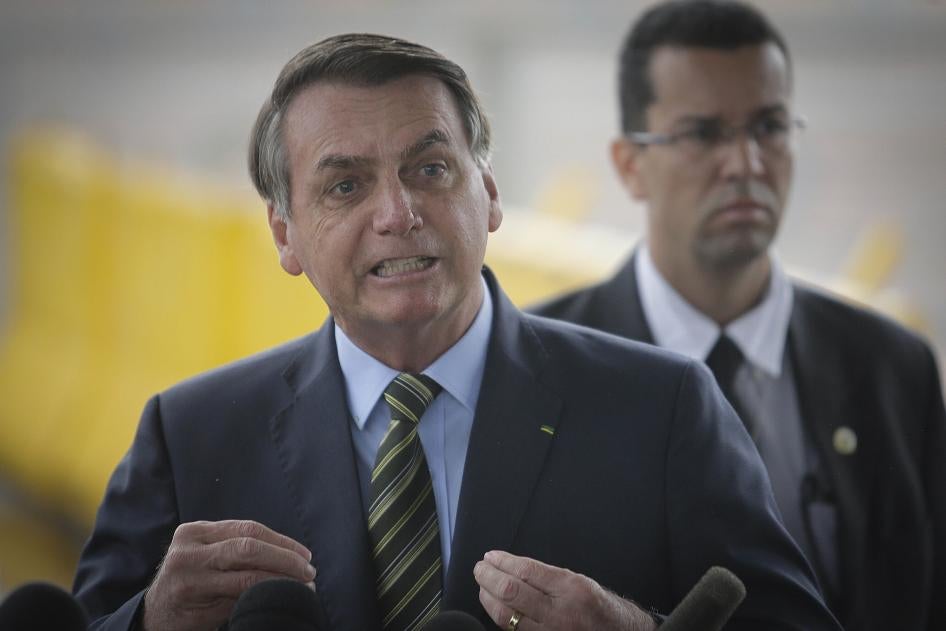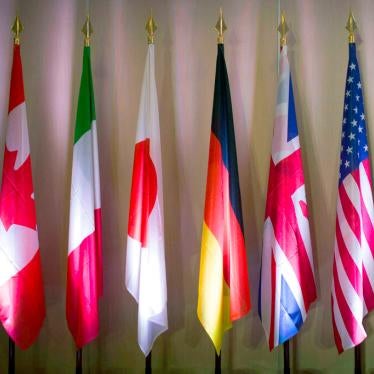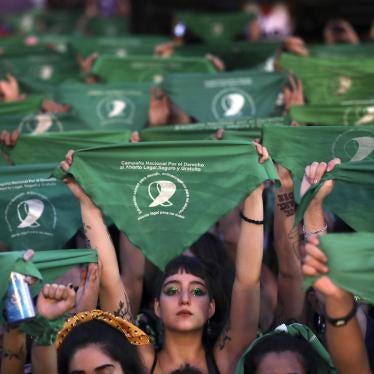(São Paulo) – President Jair Bolsonaro is putting Brazilians in grave danger by urging them not to comply with social distancing and other measures to slow the spread of COVID-19 from state governments and his own Health Ministry, Human Rights Watch said today. He has also acted recklessly by disseminating misleading information about the pandemic.
“For weeks, Bolsonaro has been sabotaging the states’ and his own Health Ministry’s efforts to contain the spread of COVID-19 and putting the lives and health of Brazilians at grave risk,” said José Miguel Vivanco, Americas director at Human Rights Watch. “To avoid preventable deaths from this pandemic, leaders should ensure that people have access to accurate, evidence-based information essential to protecting their health. President Bolsonaro is doing everything but that.”
As of April 10, 2020, Brazil had 18,397 confirmed cases of COVID-19, and 974 Brazilians had died from it.
On March 20, Bolsonaro issued an executive order to strip states of the authority to restrict people’s movements to contain COVID-19. Four days later, the Supreme Court revoked that order.
On March 26, Bolsonaro issued a presidential decree that exempted churches and lottery houses from state and municipal health regulations by classifying them as essential services, thus allowing people to congregate there. The next day, a federal court suspended that decree, ruling that it violated federal law. The court also barred the government from adopting measures against social distancing enacted by states.
On March 23, Bolsonaro issued a presidential order suspending deadlines for government agencies to respond to public information requests including explicitly on its own policies to address the health emergency. The deadline suspension would apply to government agencies that had asked their employees to stay in quarantine or work from home, or had taken “similar measures.” If the government denies the information, the petitioner cannot appeal.
The presidential order also suspended deadlines to provide other types of information in certain circumstances.
This order followed an attempt by the Bolsonaro administration, in January 2019, to undermine Brazil’s access to information law by issuing a decree that expanded officials’ powers to classify information as secret or top secret. Congress thwarted that attempt by rejecting the decree.
Although extending deadlines to respond to information requests may be reasonable during an emergency, given the president’s recent actions and record, this presidential order could effectively deprive the right of access to information of all meaning, Human Rights Watch said.
The order was to be applicable until at least December 31, 2020, but on March 26, a Supreme Court justice issued a preliminary injunction, pending a decision by the full court. In his ruling, the justice asserted that the order “attempts to transform exceptions – information kept secret – into the rule, impeding the full implementation of the principles of publicity and transparency.” Congress, which needs to review the presidential order, should revoke it, Human Rights Watch said.
Despite the potentially life-threatening risk to Brazilians’ health, since the beginning of the crisis, Bolsonaro has minimized the gravity of COVID-19, comparing it to a “little flu” or a “cold,” calling it a “fantasy” promoted by the media. He has labeled preventive measures “hysterical” and repeatedly called on state governors to lift social distancing orders put into effect to prevent the spread of the disease.
“The risk group are people over 60 so why close schools,” he said on a televised speech on March 24. “Each family has to protect its elderly people, not to throw that responsibility to the state,” he said on April 8. “Some people are going to die,” he told reporters on March 27, and added: “I’m sorry; that’s life.”
President Bolsonaro has disregarded social distancing recommendations himself and encouraged people who are not “older” to do the same, putting them at risk of contagion.
He called on people to participate in a pro-government rally on March 15 and plunged into a crowd shaking hands. At the time, he was supposed to be in quarantine, since twenty-four people who had traveled to the United States with him had tested positive for the virus.
In a prime-time television address on March 24, he called on Brazilians to “go back to normal.” At least 25 of Brazil’s 27 state governors decided to maintain restrictions to prevent the spread of COVID-19 even after Bolsonaro called for an end to quarantines.
On March 28, a federal judge ordered the federal government not to carry out a publicity campaign under the hashtag in Portuguese “#Brazilcannotstop” that would have urged Brazilians to flout social distancing recommendations. The president’s communication office had already published two social media postings with that slogan. The president’s son, Senator Flavio Bolsonaro, had distributed a video with the federal government logo that was supposedly part of the campaign.
The judge ruled that the campaign contradicted Health Ministry recommendations.
President Bolsonaro posted a video on April 1 that said there were shortages of food and other essential products in the city of Contagem because of the Minas Gerais state government’s measures. His own agriculture minister later said the information was false. Bolsonaro has also said the authorities in São Paulo, the state that has suffered the most deaths so far, were falsely overstating the number of dead, without providing any evidence.








